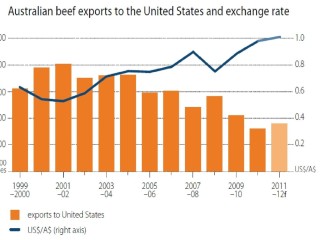 A high Australian dollar is likely to place further pressure on cattle prices next year, according to the Government’s official commodity forecaster.
A high Australian dollar is likely to place further pressure on cattle prices next year, according to the Government’s official commodity forecaster.
The Australian Bureau of Agricultural and Resource Economics and Sciences believes cattle prices will be 7pc lower on average in 2011-12, based largely on the inflationary effect of a high $A on the price of Australian beef in export markets.
The forecasts are included in ABARES’s June 2011 commodity outlook report.
Prices for young cattle are the exception, with grass-fuelled restocker demand expected to place upward pressure on prices for that category, particularly in south eastern Australia.
ABARES believes the suspension of live cattle exports to Indonesia will result in the diversion of some northern cattle into domestic saleyards. However, it believes the impact on overall Australian cattle prices will be limited, given that exports to Indonesia account for only 5pc of total cattle turnoff in Australia. Heavy impacts would be felt by producers highly dependent on the live cattle trade in northern Australia the longer the suspension went on.
After a four year contraction in the size of the Australian cattle herd, producers were now responding to a widespread improvement in seasonal conditions by retaining greater numbers of females for herd rebuilding.
The final number of cattle slaughtered for the current financial year is likely to be around 8.1 million head according to the report. That is the lowest level since 1996, reflecting the larger numbers of female cattle being held for breeding.
With more calves being bred and branded the national cattle herd is estimated to grow by 3pc in 2010–11 to 27.4 million head and by a further 2pc in 2011–12 to around 28 million head.
The better seasons have resulted in higher average carcase weights in all states except drought-affected Western Australia.
Australian beef exports are forecast to rise 3pc in 2011-12 to 975 000 tonnes.
Australian exports to the US fell by 24pc this financial year to 160,000 tonnes, reflecting an increase in US slaughter rates, competition from low priced Mexican beef and an erosion in the competitiveness of Australian beef due to the high $A.
Exports to the US are forecast to make up some of the lost ground to total 180,000 tonnes in 2011-12, as improved seasonal conditions in the US encourage herd rebuilding and support higher demand for imported beef, including from Australia. However, an assumed appreciation in the Australian dollar over the next 12 months remained “a significant risk to the outlook for Australian beef exports to the US market”.
Not only is the higher $A making Australian beef harder to sell into the US, the continued weakness of the $US is likely to facilitate further growth for US beef into Japan and Korea at the expense of Australian beef.
Australian beef exports to Japan are set to decrease by 3pc in 2011–12 to 335 000 tonnes.
While US exports are taking a larger share of the Korean market, Australian exports to Korea are likely to rise by 7pc to150 000 tonnes as strong economic growth and stalled domestic production as a result of the recent foot and mouth disease outbreak drive increased demand for imported beef.
The United States Meat Export Federation has recently expanded its marketing program in Korea to convince consumers of the safety of US beef, which was shut out of the Korean market in 2003 when a case of BSE was discovered in the US. Exports from the US to Korea resumed in July 2008.
The report also underlines the positive trends in emerging markets.
For example, exports to the Russian Federation in 2010-11 increased by 188pc to an estimated 72 000t; exports to China doubled to an estimated 14,000t; exports to the European Union increased by 50pc to an estimated 14,000t; and exports to the Middle East rose by 51pc to an estimated 30,000t.
In 2011–12 the total volume of exports to emerging markets is forecast to continue rising a further 3pc.
